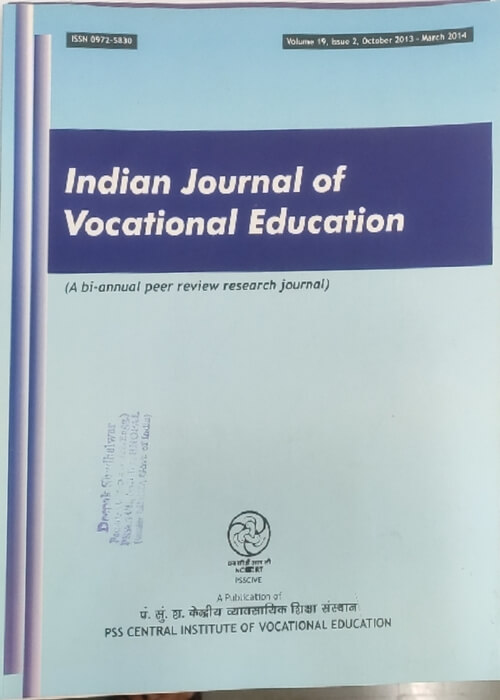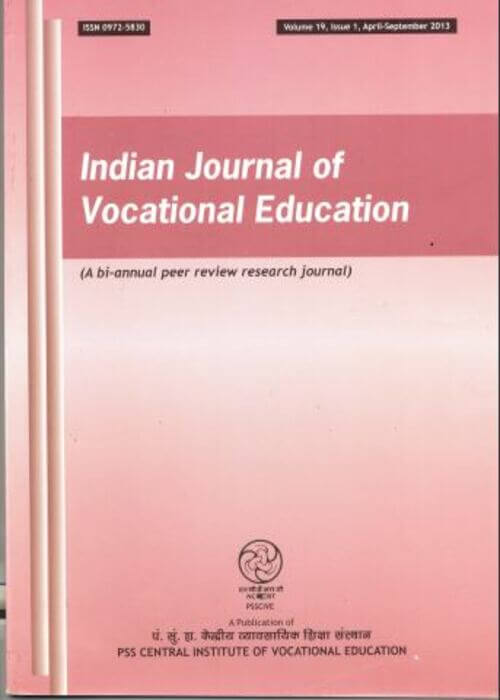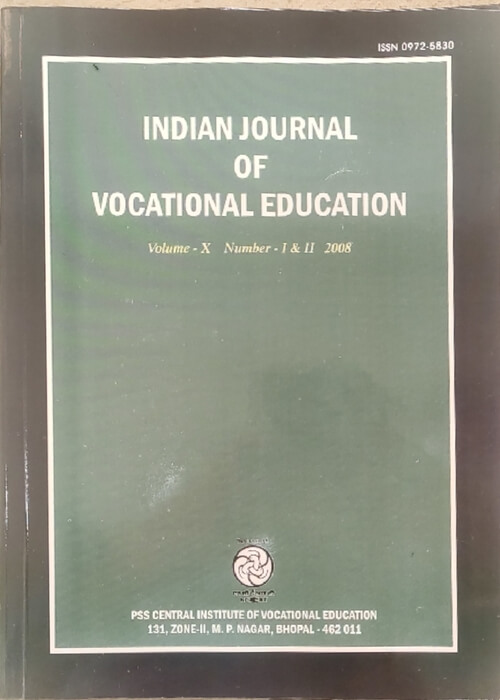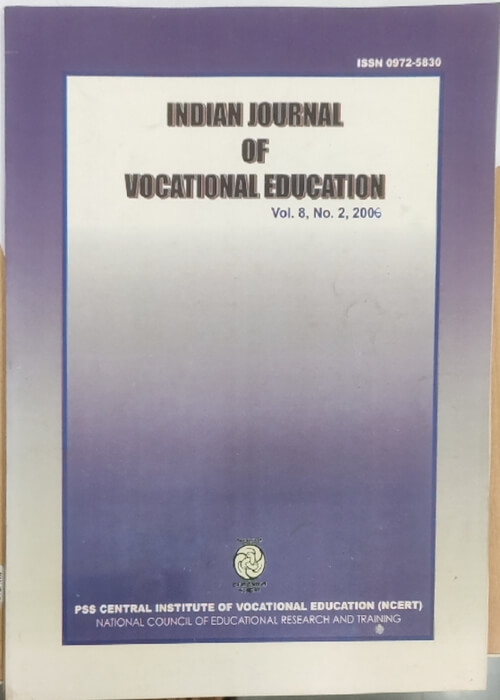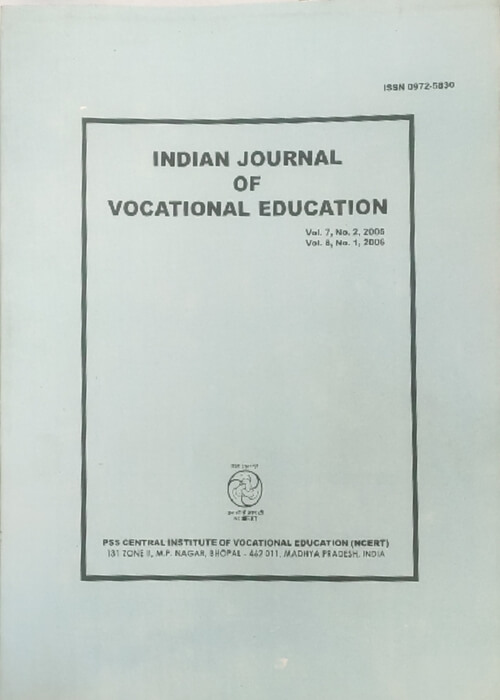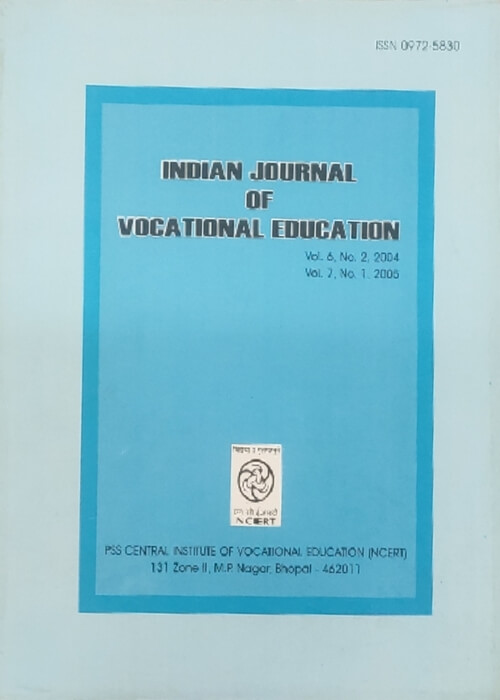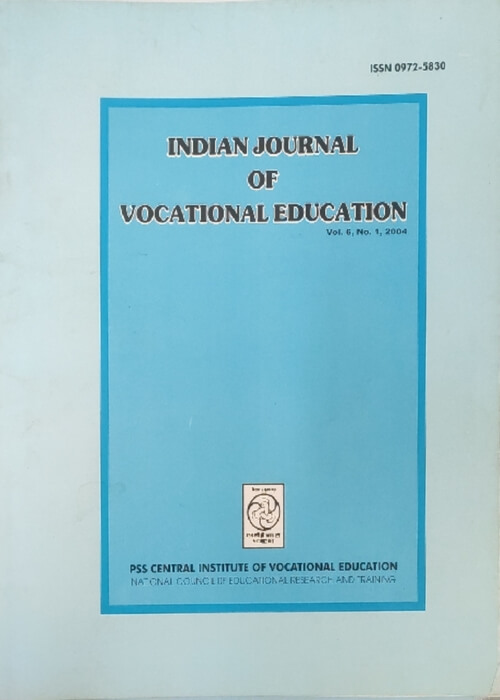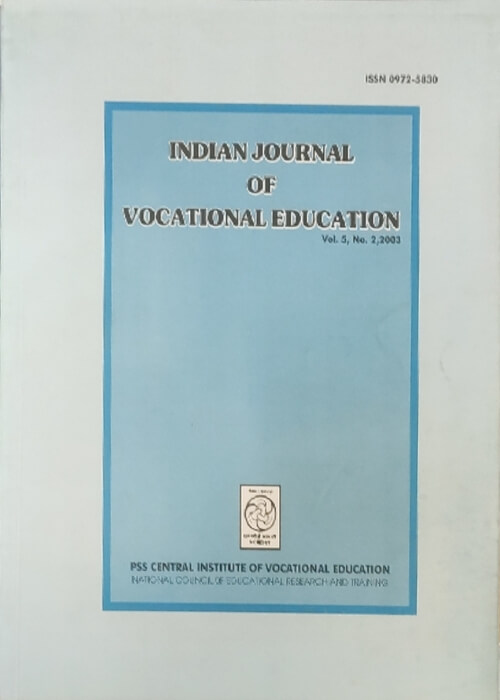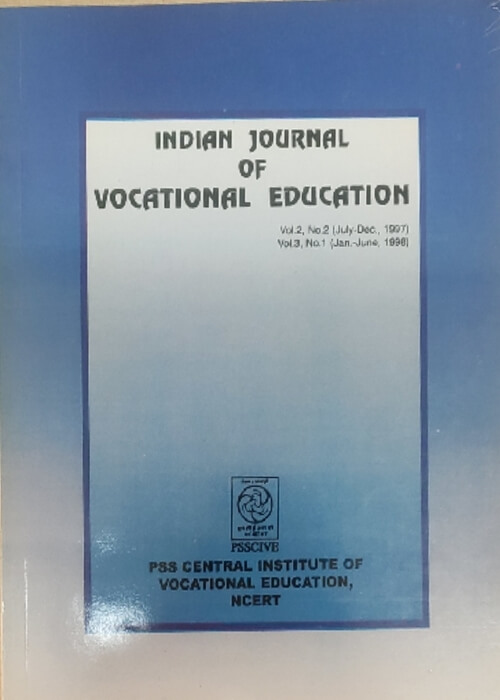
Indian Journal of Vocational Education (IJVE)
Indian Journal of Vocational Education (IJVE) is a Bi-annual peer reviewed research Journal (ISSN 0972–5830) published by PSS Central Institute of Vocational Education (PSSCIVE), a constituent unit of National Council of Educational Research and Training (NCERT), New Delhi under Ministry of Education, Government of India. The main focus of this journal is to provide a platform for researchers, scholars, academicians to share their research findings in the field of vocational education and training.
Current Issues
Call for Papers
The Institute propose to publish its next issue as a special issue. Researchers, scholars, teachers, administrators, specialists, doctoral students, preservice and in-service teachers and other professionals are invited to submit their research reports/ articles in the area of vocational education and training.
Vocational Education and Training in the Digital Age:
Opportunities and Challenges vis-à-vis NEP 2020
- Skills needed for transition towards digitalization
- Skills needed for transition towards sustainable development
- Technology integration in VET
- E-portfolio, simulation/Virtual labs in VET
- Digital competencies of VET teachers
- Open educational resources in VET
- E-learning initiatives in VET
- Industry-Academia linkages in VET
- Teacher’s professional development opportunities
- Techpreneurship in VET
- Impact of emerging technologies- AI and ML in VET
- University-Industry Government Tripartite
- Mental Health and Behavioral shift in ecosystem of VET
- VET as an engine of Innovation, Job creation and Transformative change
- Researches in VET due to digitalization}
- Emotional Intelligence in VET to enhance employability skill
- Transversal skill in VET: Pedagogy and Assessment
Guidelines for submission of manuscripts
The guidelines for submission of manuscripts for the Journal are as follows:
The submission of manuscripts IJVE implies that the paper has not been published or sent for publication elsewhere.
The following three types of manuscripts will be considered:
Reports of Original Research
Reports of Original Research shall include a clear statement of purpose, a review of the relevant literature, a description of the methods, and a discussion of the findings and the implications for practice in the broader field of education.
Short Communications
A short communication is suitable for recording the results of complete small investigations or giving details of new models or hypotheses, innovative methods or techniques. Short communications should be 2 to 4 printed A4 size pages in length.
Reviews
A short communication is suitable for recording the results of complete small investigations or giving details of new models or hypotheses, innovative methods or techniques. Short communications should be 2 to 4 printed A4 size pages in length.
Manuscript Submission
The manuscript should be submitted in English in double line spacing with 1-inch margins. It should reflect the original work and should not be published previously in print or electronic form.
The text should be approximately between 3000 to 5000 words, double spaced, in 12 pt. Times New Roman typeface, and introduced with a 100-word abstract. There should be a one-inch margin on all sides of an 8 ½ x 11-inch page. The manuscript should conform to the style specifications of the American Psychological Association as described in the Concise Rules of APA Style, Seventh Edition, published by the Association in 2019. A reasonable number of clear tables and/or figures may be included at the end of the text.
Consistent with the policy of blind review, the author(s)’ name(s), role(s), and institutional affiliation(s) should be listed only on a cover page that will be removed before the manuscript is sent to the reviewers. That cover page should include the name of the corresponding author, e-mail and postal addresses, and telephone number. References to the author(s)’ previous work should be listed as Author(s) in the citations and references. Acknowledgment of cooperating scholars or professionals and funding sources should be added to the end of the manuscript.
Manuscript Submission
The corresponding author will receive a notice of receipt of the manuscript within two weeks and if accepted for review, they will receive the reviewers’ decision within two months. Four types of decisions are made: Accept as submitted, accept with revisions, Revise and resubmit, or Not accepted. All manuscripts will be judged on adherence to the Guidelines for Authors, the quality and significance of the content, the inclusion of a valid discussion of implications for practice in the broader field of Vocational Education and Training, and the clarity and cohesion of the text.
Upon acceptance of a manuscript, the author(s) will be expected to agree to assign the rights to the copyright to IndianJournal of Vocational Education, with the authors retaining broad duplication and distribution rights for teaching and related educational uses.
Editorial policies
Authorship
Principal authorship, authorship order, and other publication credits should be based on the relative scientific or professional contributions of the individuals involved, regardless of their status. A student is usually listed as principal author on any multiple-authored publication that substantially derives from the student’s dissertation or thesis
Acknowledgments
The acknowledgments of people and funding agency should be mentioned in brief. All contributors who do not meet the criteria for authorship should be listed in an Acknowledgments section. Examples of those who might be acknowledged include a person who provided purely technical help, or a department chair who provided only general support.
Funding
Indian Journal of Vocational Education requires all authors to acknowledge their funding in a consistent fashion under a separate heading or state that this research received no specific grant from any funding agency in the public, commercial, or not-for-profit sectors
Declaration of conflicting interests
IJVE encourages authors to include a declaration of any conflicting interests.
Please include any declaration in file separate from the main text, after any acknowledgments, under the heading “Conflicts of Interest”. When making a declaration the disclosure information must be specific and include any financial relationship that all authors of the article has with any sponsoring organization and for profit interests the organization represents, and with any for-profit product discussed or implied in the text of the article.
Publishing policies
Publication ethics
PSS Central Institute of Vocational Education (PSSCIVE) is committed to upholding the integrity of the academic record. Journal policy prohibits an author from submitting the same manuscript for consideration by another journal and does not allow publication of a manuscript that has been published in whole or in part by another journal.
Plagiarism
IJVE and PSSCIVE take issues of copyright infringement, plagiarism or other breaches of best practice in publication very seriously. The journal seeks to protect the rights of the authors and encourages investigation of claims of plagiarism or misuse of published articles. Where an article, for example, is found to have plagiarized other work or included third-party copyright material without permission or with insufficient acknowledgment, or where the authorship of the article is contested, we reserve the right to take action including, but not limited to: publishing an erratum or corrigendum (correction); retracting the article; taking up the matter with the head of department or dean of the author's institution and/or relevant academic bodies or societies; or taking appropriate legal action.
Manuscript Preparation
The following points may be taken care of before the typescript is sent to the Executive Editor.
Title
The title should be concise and describe the contents of the paper. The title page should include the author's full name and affiliation(s). The name of the corresponding author along with Phone, Fax and E-mail address should be mentioned.
Abstract
Author must submit an abstract of 100-200 words. It should highlight the scope of the experiments, indicate data, and point out major findings and conclusions. Complete sentences, active verbs and the third person should be used. Standard nomenclature should be used and abbreviations should be avoided. No reference or sub-heading should be used in the abstract.
Keywords
About 3 to 10 keywords that will provide indexing references should be listed.
Introduction
The introduction should provide a clear statement of the problem, the relevant literature on the subject, and the proposed approach or solution.
Materials and Methods
Materials and methods should be complete.
Procedures should be described in detail. Previously published procedures should be cited and important modifications of published procedures should be mentioned briefly.
Results
Results should be presented with clarity and precision. The results should be written in past tense when describing findings.
Discussion, Findings and Conclusion
The discussion should interpret the findings in view of the results obtained and in past studies on the topic. Conclusion should be stated in a few sentences at the end of the paper.
References
Reference should be listed in alphabetical order at the end of the article. In the text, a reference identified by means of an author's surname should be followed by a comma and the year of publication in round brackets e.g., (Singhal, 1997).
When there are more than two authors, only the first author's name should be mentioned, followed by et al. In case, an author cited has had two or more works published during the same year, the reference, both in the text and in the reference list, should be identified by a lower case letter like 'a' and 'b', after the date, to distinguish the works.
Reference to research paper/article Surname, Initials (Year).Title. Journal Name, Volume, Number, Pages. Example Singh, H.S. and Gupta, O.P. (1997). Vocational Education and Training as a Tool and Catalyst to Empower Women. Indian Journal of Vocational Education, 21(1) 41- 46. Reference to chapter in books Surname, Initials (Year).Title of the chapter, number of pages. In: editor's name (ed.) title of the book, publisher, place of publication. Example Tandon, H.P. (1997). A Model for Computer Networking in School Education System, pp.55-60. In: Saxena, H.S. (ed). Recent Advances in Educational Information and Communication Technology, Institute of Information Technology, New Delhi. Reference to books/reports Surname, Initials (Year), Title of the Book Publisher, Place of Publication. Example Saxena, R.C. (1996). Population Education, National Council of Educational Research and Training, New Delhi.
Manuscript Formatting
The formatting of the manuscript should be done as follows:
Headings
Headings must be short and should be typed in title case with 14 pt font and bold letters. Sub-headings should be typed in title case with 12 pt font and bold face. Notes and end-notes should be used only if necessary. They must be numbered consecutively in the text, enclosed in square brackets and listed at the end of the article.
Abbreviations
Each abbreviation should be spelled out for the first time.
Tables
All tables must have a title and be in a column format. Each table in the text should be cited in the order in which it appears. Tables are to be typed double- spaced throughout, including headings and footnotes. Each table should be numbered consecutively in Arabic numerals, such as Table 1.
Photographs
Only good quality photographs will be accepted for publication. Original photographs may be submitted, mentioning the reference at the back of the photograph. Graphics should be prepared using applications capable of generating high resolution GIF, TIFF, or JPEG images before pasting in the MS-Word manuscript file. Image should also be provided separately.
Illustrations
Illustrations and Figures should be numbered consecutively using Arabic numbers, such as Figure 1, with a brief title. All illustrations should be in good quality with captions. Illustrations should not exceed 81/2 x 11 inches and lettering should be 11/2 mm high preferably TIFF/JPEG with a resolution of 600 dpi.
Manuscript Submission
Manuscripts should be submitted to:
Professor
PSSCIVE, NCERT Shyamla Hills, Bhopal – 462 013, Madhya Pradesh, India
ijvepss2022[at]gmail[dot]com
07552704143
www.psscive.ac.in
Deadlines
The deadline to submit the full paper is 31st May 2022. The corresponding author of a submitted paper will be notified of acceptance or revision or rejection of his/her paper by 30th June 2022.
INDIAN JOURNAL OF VOCATIONAL EDUCATION
(A Bi-Annual Peer Reviewed Research Journal of UGC Care Volume 34 October 2022 - March 2023 ISSN 0972-5830)
-
Modern Age Learning : Understanding the Modifications of
Teaching and Learning Styles
Aadisha Nigam, Madhu Sharan, Isha Bharadwaj
-
Study of Awareness and Interest of Students towards Vocational
Education at School in Scheduled Tribe Populated Districts Madhya Pradesh
Kukila Goswami , Pinki Khanna
-
Skill Development of Secondary Students for Application of Drones:
Are We Ready
Prerana Nashine, Vinay Swarup Mehrotra
-
Impact of Employability Skills on Employment and Career Success
Shubha Mishra, Sushant Kamble, Vinay Swarup Mehrotra
-
Empowering Vocational Education Teachers with Digital
Competencies for 21stCentury Learning
Preeti Dixit, R. Ravichandran
-
Vocational Career Guidance and Counseling in School
R. Ravichandran
-
A Study of Attitude of Secondary School Students and Teachers
towards Vocational Education
Shilpa Acharya, Saurabh Kumar
-
A Study of Implementation of Rubric Based Assessment of
Automobile Technology Vocational Subjects under NSQF in the
Selected School of Haryana and Himachal Pradesh
Tribodh Tripathi, Ravi Limaye, Saurabh Prakash
-
Assessing the Status of Vocational Education under Samagra
Shiksha : A Critical Analysis of Online Regional Consultive Meeting
Outcomes
Jayashree Mahapatra, R. Ravichandran
-
Study of Perception of Vocational Teachers on the Use and
Effectiveness of Teaching Methods in Agriculture Vocational Subject
at Higher Secondary Schools of Haryana & Himachal Pradesh
Vinay Swarup Mehrotra
INDIAN JOURNAL OF VOCATIONAL EDUCATION
(A Bi-Annual Peer Reviewed Research Journal of UGC Care Volume 35 April 2023 – September 2023 ISSN 0972-5830)
-
Skill Development Opportunities and its Influence on Employability of
Students
Deeksha Chaurasia, Punnam Veeriah
-
Responsible Stakeholders: Key towards Successful Inclusion
Picka Nigam, Saurabh Kumar
-
Situating Vocational Education in Social Science University: A case study of
best practices in VET
Fariha Siddiqui, Akha Kaihrii Mao
-
Collaborating for Success: The Importance of International Cooperation in
Vocational Education
Jayashree Mahapatra, R. Ravichandran
-
Inclusive Vocational Education: Key to Women Empowerment and
Sustainable Livelihoods: A case study of Home Based Zardozi Women
Artisans of Bhopal
Meeta Siddhu, Anjali Karolia
-
The Impact of Vocational Education on Economic Growth and Development
across the G20 Countries
R. Ravichandran
-
Aspirations of Undergraduate Students of Vocational Education
Programmes: An Exploratory Study at AUD
Loveina Joy
-
Vocationalisation of Healthcare Education: Driver of Growth
Sudha Tiwari
-
Effect of Nutrition Education Regarding Food Safety and Hygiene on
Knowledge, Attitude and Practice (KAP) of Street Beverage Vendors of
South Delhi
Garima Malhotra, Shalini Kushwaha, Namrata Singh
-
Learning in Practice: An Ethnographic Exploration of the Meaning of
Learning at a Maritime Training Institute
Avanish Singh, Rafikh Shaikh, Tejaswini Bhaskar Arindam Bose, Shamin Padalkar
-
Future of Work: Mentoring, Tinkering and Skilling
Rabindranath Lenka
INDIAN JOURNAL OF VOCATIONAL EDUCATION
(A Bi-Annual Peer Reviewed Research Journal of UGC Care Volume 32-33 October 2021 – September 2022 ISSN 0972-5830)
-
Engineering Faculty Leadership Development: A Case Study
Thanikachalam Vedhathiri
-
Future of Technical Vocational Education and Training
&TVET in Future:(A reference to Post Covid-19)Y P Chawla & R S P Singh
-
A Study on Acquisition of Green Skills among School
Students of Vocational Courses under National Skill
Qualification FrameworkR. Ravichandran, Jayashree Mahapatra
-
Effective Assessment of Teaching in Interdisciplinary
Engineering Postgraduate ProgramsThanikachalam Vedhathiri
-
Collaborative Mentoring for Developing Core Competence of the Institute
Pratibha Bundela Gupta & B. L. Gupta
-
Professional Skills in Mechanical Technology Education
for VTE Students’ Private Enterprise Development After SchoolChimezie Festus
-
TVET culture in Australia: The Bigger Picture
Ruchi Payal
-
Strengthening Access and Equity of TVET through
Mahatma Gandhi’s Nai Talim: with Special Reference
to the Buniyadi Vidyalayas in BiharSuprabha Dey & Asheesh Srivastavas
-
The Role of Vocational Education in Prison for Inmate Corrections
Hitesh Goyal & Pramila Tiwari
-
Skill Development and Employment Opportunities in Food
Processing Industry: A Futuristic PerspectivePreeti Dixit & R. Ravichandran
-
Motivating LIS Professionals for Developing Skill in Digital Environment
Kukila Goswami

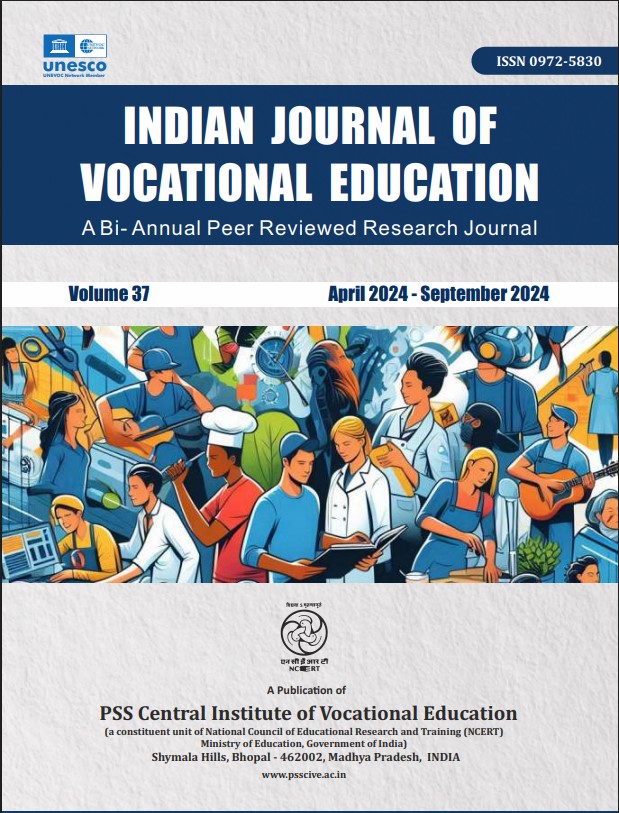 Volume 37 April 2024 - September 2024
Volume 37 April 2024 - September 2024
 Volume 36 October 2023 – March 2024
Volume 36 October 2023 – March 2024
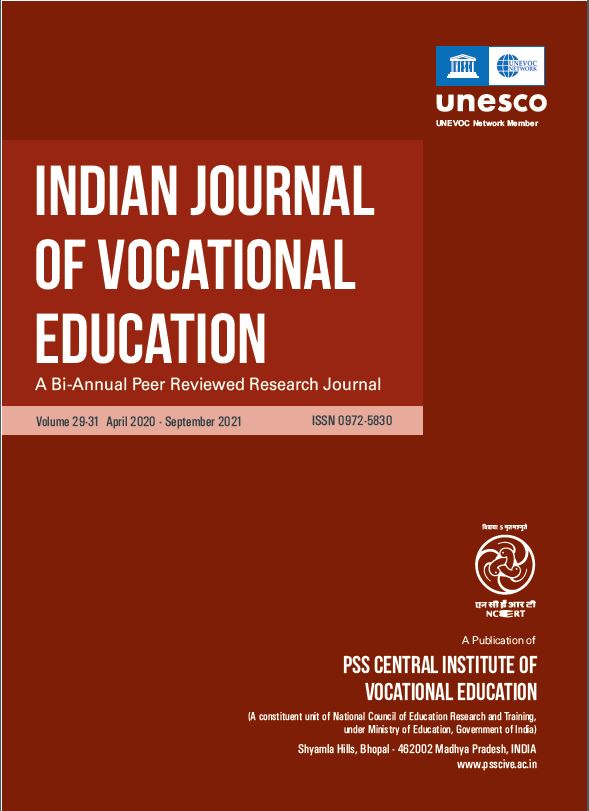
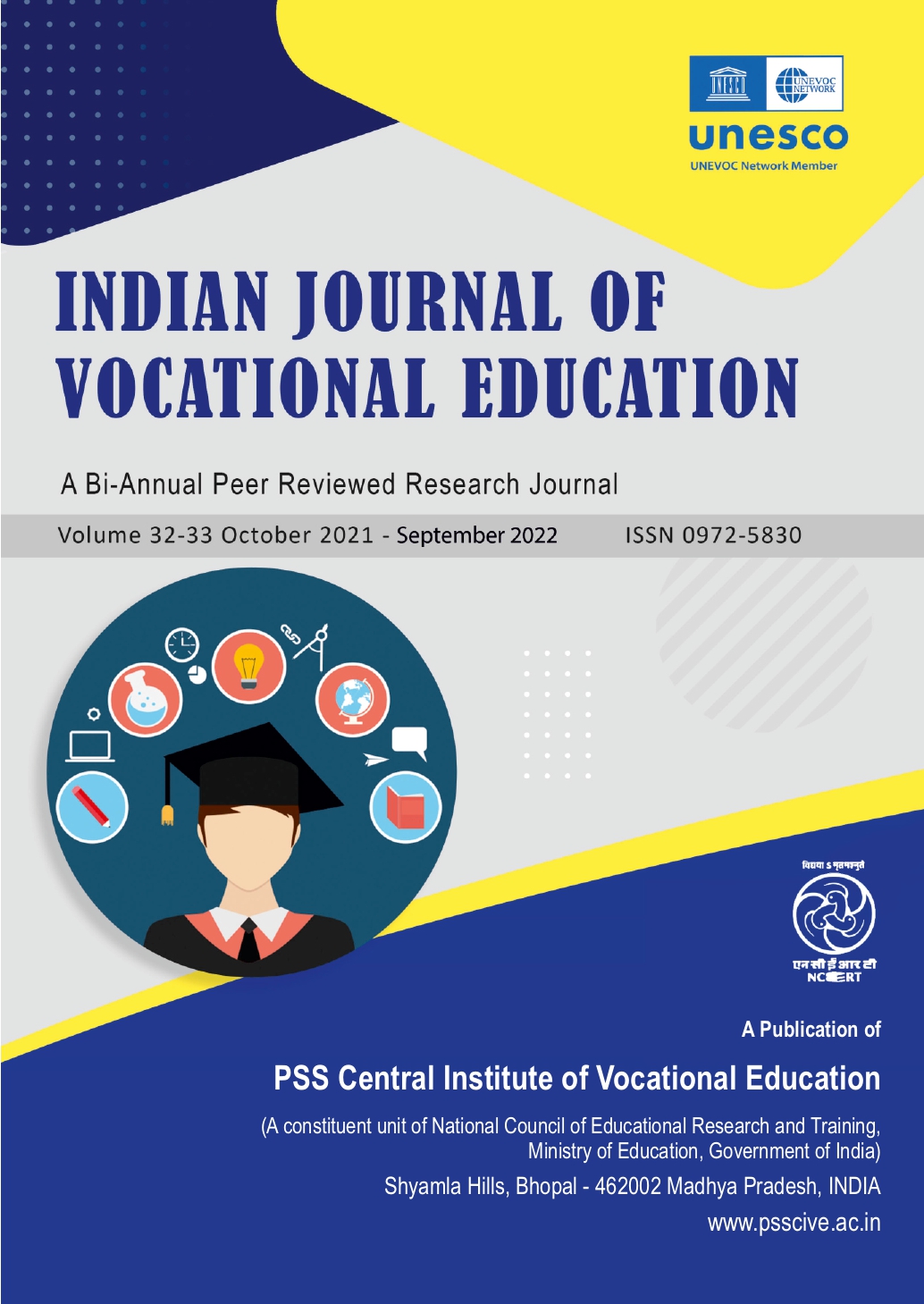 Volume 32-33 October 2021 – September 2022
Volume 32-33 October 2021 – September 2022
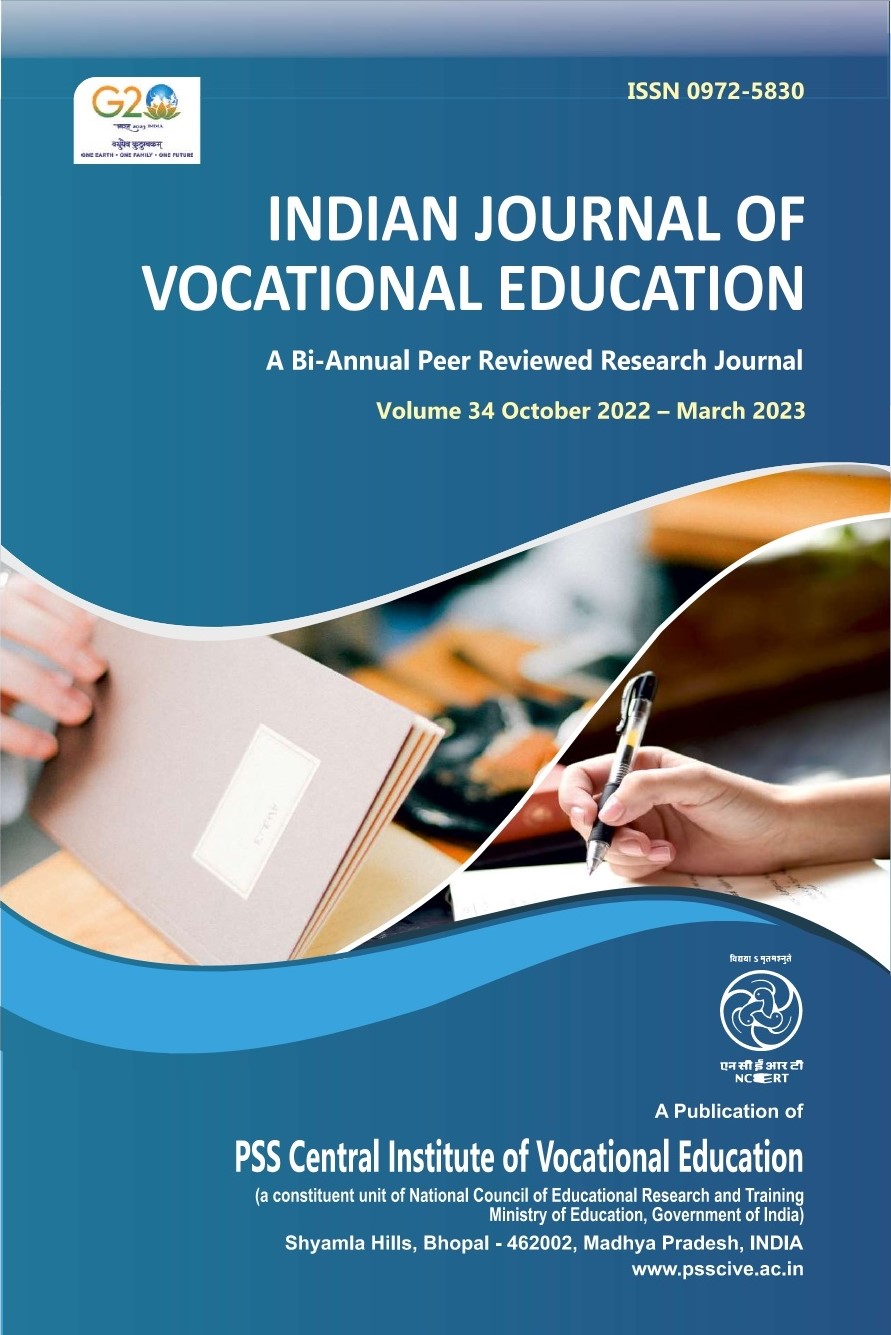 Volume 34 October 2022 - March 2023
Volume 34 October 2022 - March 2023
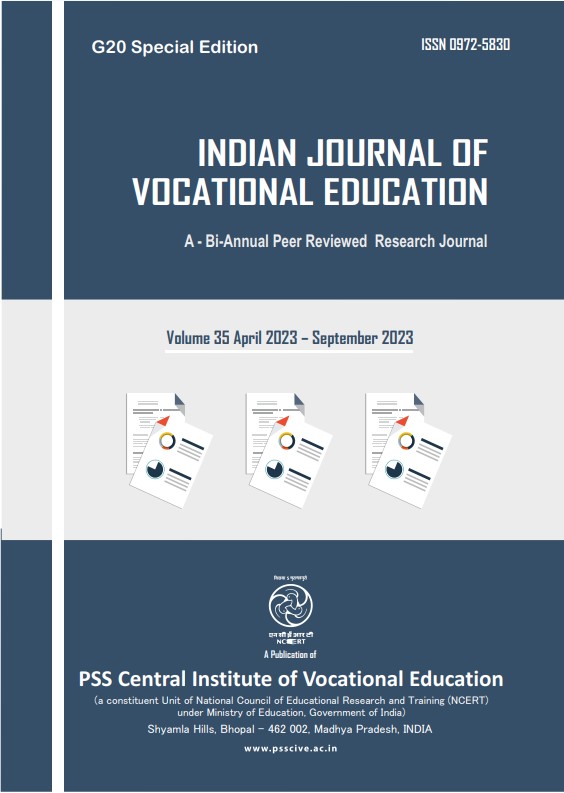 Volume 35 April 2023 – September 2023
Volume 35 April 2023 – September 2023
